11 start with J start with J
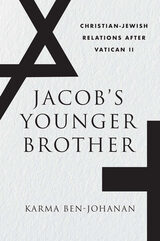
A Seminary Co-op Notable Book
“An astute and evenhanded study of how both faiths view themselves and each other.”
—Publishers Weekly
“An illuminating and important new book…An intellectual, cultural, and political challenge…[F]or anyone for whom the Jewish-Christian story is an important element in defining his or her identity.”
—Israel Jacob Yuval, Haaretz
“An extraordinarily sophisticated, insightful and provocative examination of how Roman Catholics and Orthodox Jews addressed the prospect of reconciliation in the second half of the twentieth century.”
—Glenn C. Altschuler, Jerusalem Post
“A volume from which both Jewish and Catholic scholars may learn…This is an excellent book.”
—Eugene J. Fisher, Catholic News Service
A new chapter in Jewish-Christian relations opened in the second half of the twentieth century when the Second Vatican Council exonerated Jews from the accusation of deicide and declared that the Jewish people had never been rejected by God. In a few carefully phrased statements, two millennia of deep hostility were swept into the trash heap of history.
But old animosities die hard. While Catholic and Jewish leaders publicly promoted interfaith dialogue, doubts remained behind closed doors. Drawing on extensive research in contemporary rabbinical literature, Karma Ben-Johanan shows that Jewish leaders welcomed the Catholic condemnation of antisemitism but were less enthusiastic about the Church’s sudden urge to claim their friendship. Catholic theologians hoped Vatican II would turn the page on an embarrassing history, while Orthodox rabbis, in contrast, believed they were finally free to say what they thought of Christianity.
Jacob’s Younger Brother pulls back the veil of interfaith dialogue to reveal how Orthodox rabbis and Catholic leaders spoke about each other when outsiders were not in the room. There Ben-Johanan finds Jews reluctant to accept the latest whims of a Church that had unilaterally dictated the terms of Jewish-Christian relations for centuries.
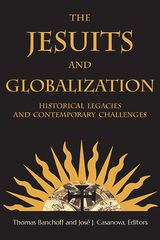
The Society of Jesus, commonly known as the Jesuits, is the most successful and enduring global missionary enterprise in history. Founded by Ignatius Loyola in 1540, the Jesuit order has preached the Gospel, managed a vast educational network, and shaped the Catholic Church, society, and politics in all corners of the earth. Rather than offering a global history of the Jesuits or a linear narrative of globalization, Thomas Banchoff and José Casanova have assembled a multidisciplinary group of leading experts to explore what we can learn from the historical and contemporary experience of the Society of Jesus—what do the Jesuits tell us about globalization and what can globalization tell us about the Jesuits? Contributors include comparative theologian Francis X. Clooney, SJ, historian John W. O'Malley, SJ, Brazilian theologian Maria Clara Lucchetti Bingemer, and ethicist David Hollenbach, SJ. They focus on three critical themes—global mission, education, and justice—to examine the historical legacies and contemporary challenges. Their insights contribute to a more critical and reflexive understanding of both the Jesuits’ history and of our contemporary human global condition.

The first complete translation into a modern language of a major authority on the medieval Christian liturgy.
Honorius Augustodunensis’s Jewel of the Soul (the Gemma animae) gleams as one of the most attractive liturgical commentaries from the twelfth century. A lively and effective teacher, Honorius strives to unveil the meaning behind the sacred texts, objects, music, and ritual of the Roman Mass and Divine Office for young initiates. Building on the allegorical approach pioneered in the Carolingian era by Amalar of Metz, he shows readers how their souls are beautified by the liturgy as gold is by a jewel. His flowing and comprehensive commentary gained widespread influence in Western Christendom and was an important source for later liturgical treatises. For the modern scholar this work remains key to understanding the medieval allegorical approach to worship and provides valuable documentation about how these offices were celebrated in the twelfth century. These volumes offer the first complete translation into a modern language of this foundational Latin text on Christian liturgy.

The first complete translation into a modern language of a major authority on the medieval Christian liturgy.
Honorius Augustodunensis’s Jewel of the Soul (the Gemma animae) gleams as one of the most attractive liturgical commentaries from the twelfth century. A lively and effective teacher, Honorius strives to unveil the meaning behind the sacred texts, objects, music, and ritual of the Roman Mass and Divine Office for young initiates. Building on the allegorical approach pioneered in the Carolingian era by Amalar of Metz, he shows readers how their souls are beautified by the liturgy as gold is by a jewel. His flowing and comprehensive commentary gained widespread influence in Western Christendom and was an important source for later liturgical treatises. For the modern scholar this work remains key to understanding the medieval allegorical approach to worship and provides valuable documentation about how these offices were celebrated in the twelfth century. These volumes offer the first complete translation into a modern language of this foundational Latin text on Christian liturgy.

John Cuthbert Ford, SJ (1902-1989) was one of the leading American Catholic moralists of the 20th century. This is the first full-length analysis of his work and influence, one that not only reveals a traditionally Catholic method of moral analysis but also illuminates the conflicts behind and development of Catholic moral teaching during the volatile 1960s.
Ford is best known for his influential contribution to Catholic teachings on three moral issues. His objection to the Allied practice of obliteration bombing during WWII by drawing a sharp distinction between combatants and noncombatants is still studied widely today. Ford campaigned for alcohol education for both clergy and laity and introduced a pastoral approach for assisting and counseling alcoholics. As a member of the Papal Commission on Population, Family, and Birth Rate during the 1960s, Ford was an unyielding defender of the traditional Catholic teaching on birth control that still reigns today.
Drawing on the published works and personal papers of Ford, Eric Genilo begins with a brief description of the theologian's life, career, and influence. The book is divided into two parts. In Part I, Method, Genilo offers an overview of Ford's moral theology in the "manualist" tradition—a 300-year period during which Catholic priests used manuals to instruct the faithful on matters of morality and sin. Genilo then examines Ford's two modes of resolving moral cases and presents Ford's approach to doctrinal development. In Part II, Moral Objectivity, Genilo shows how Ford confronted the growing situation ethics movement, then moves to how he understood freedom and subjective culpability, particularly in the case of alcoholism. Later chapters reveal Ford's theological conflicts with Josef Fuchs, SJ on the issue of birth control, his staunch opposition to totalitarianism, and his moral analysis of how society should treat marginalized persons threatened by the abuse of power.
Genilo concludes with an assessment of Ford's legacy to the development and practice of moral theology, leaving the reader with an in-depth portrait of an extraordinary man who dedicated his life to defending the Church and protecting the most vulnerable persons in society.
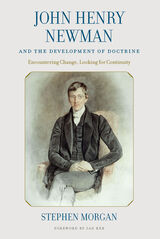

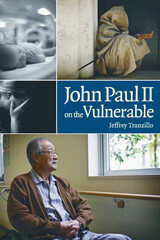
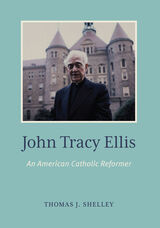
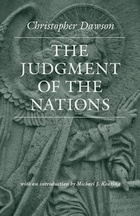

The just peace movement offers a critical shift in focus and imagination. Recognizing that all life is sacred and seeking peace through violence is unsustainable, the just peace approach turns our attention to rehumanization, participatory processes, nonviolent resistance, restorative justice, reconciliation, racial justice, and creative strategies of active nonviolence to build sustainable peace, transform conflict, and end cycles of violence. A Just Peace Ethic Primer illuminates a moral framework behind this praxis and proves its versatility in global contexts.
With essays by a diverse group of scholars, A Just Peace Ethic Primer outlines the ethical, theological, and activist underpinnings of a just peace ethic.These essays also demonstrate and revise the norms of a just peace ethic through conflict cases involving US immigration, racial and environmental justice, and the death penalty, as well as gang violence in El Salvador, civil war in South Sudan, ISIS in Iraq, gender-based violence in the Democratic Republic of Congo, women-led activism in the Philippines, and ethnic violence in Kenya.
A Just Peace Ethic Primer exemplifies the ecumenical, interfaith, and multicultural aspects of a nonviolent approach to preventing and transforming violent conflict. Scholars, advocates, and activists working in politics, history, international law, philosophy, theology, and conflict resolution will find this resource vital for providing a fruitful framework and implementing a creative vision of sustainable peace.
READERS
Browse our collection.
PUBLISHERS
See BiblioVault's publisher services.
STUDENT SERVICES
Files for college accessibility offices.
UChicago Accessibility Resources
home | accessibility | search | about | contact us
BiblioVault ® 2001 - 2024
The University of Chicago Press









